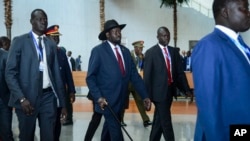South Sudan's President Salva Kiir has accused several foreign envoys of bias against his government, as the envoys try to help Kiir and the opposition strike a deal on the number of states in the country.
The president wants to keep the current 32 states, a number he imposed unilaterally during South Sudan's civil war. Opposition parties want to revert to the 10 states that the country had upon independence in 2011.
Speaking Friday at a meeting in Juba, Kiir accused special envoys who attended last weekend’s summit in Addis Ababa of twisting his words and trying to prolong the dispute for their own benefit.
“Anything I say, they go and turn it around and give the wrong report to their committee chairpersons,” Kiir said. “And these are the so-called special envoys who are saying something different to their heads. ... One day when we reach an agreement, they will be jobless, and that is why they don’t want to be jobless, so that they continue to survive on the blood of South Sudanese.”
Kiir flatly rejected proposals to create 23 states or return to the original 10 and chided the envoys for thinking they know what is best for South Sudan.
“There are very funny people, who have fitted themselves among us, to be the ones knowing what we want," he said.
Jobs at stake, Kiir says
Kiir said his government had built a huge workforce after creating 32 states, and he argued that many South Sudanese would be jobless if the country were to return to 10 states.
The Independent Boundaries Commission, a body tasked with determining the final number of states and boundaries, failed to resolve the matter. Kiir and opposition leader Riek Machar have met several times in Juba and elsewhere to attempt to resolve the issue but haven't reached a compromise.
Special envoys Ismail Wais of the Intergovernmental Authority on Development, David Mabuza of South Africa, Kalonzo Musyoka of Kenya and Betty Bigombe of Uganda failed to persuade Machar and Kiir last weekend to reach a deal at an African Union-sponsored summit. The AU issued a communique suggesting the dispute over the number of states was a South Sudanese matter.
Friday's meeting was attended mostly by Kiir supporters, as the opposition SPLM-in-Opposition boycotted the meeting. Most of those in the crowd were governors, ministers, and pro-government youth, women and civil society advocates.
Maridi state Governor Africano Monday said any move to reduce the 32 states would be a mistake.
“The number one challenge as well as threat to peace and security in our country is any decision to drastically alter or cancel the current status of states,” said Maridi.
Residents' comments
A 40-year-old Juba resident who preferred to be identified only as Rolda for security reasons said he supported having 32 states and stood by any decision Kiir made.
“Any step the president takes now, it is our step all, because he represents us all,” Rolda said. “He is consulting us to find what our views are. So any step he takes, we will support him.”
However, Juba resident Peter Gatkouth said he supported the proposal to create 23 states plus Abyei, a disputed border area, and called Friday’s meeting politically motivated.
“The consultation by the president is unnecessary this time because when he declared the 32 states, he did not consult anyone,” Gatkouth told South Sudan in Focus. “So it is a waste of time to consult people again because they get a benefit of 32 states.”
Juba resident Yasin Feki Abdullah suggested the parties return to the original 10 states and agreed that Friday’s meeting was useless.
“The consultation is not productive because it was just a one-day process,” Abdullah told South Sudan in Focus. “The issue of the states was supposed to be handled since 2013, but the parties are not willing to solve these issues. It is just a waste of time.”
Abdullah said having 10 states is the only way to create peaceful coexistence among South Sudanese.






